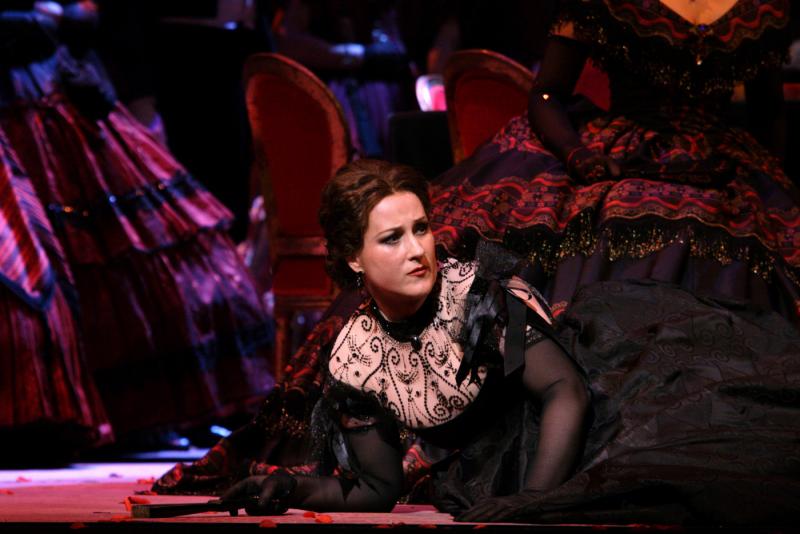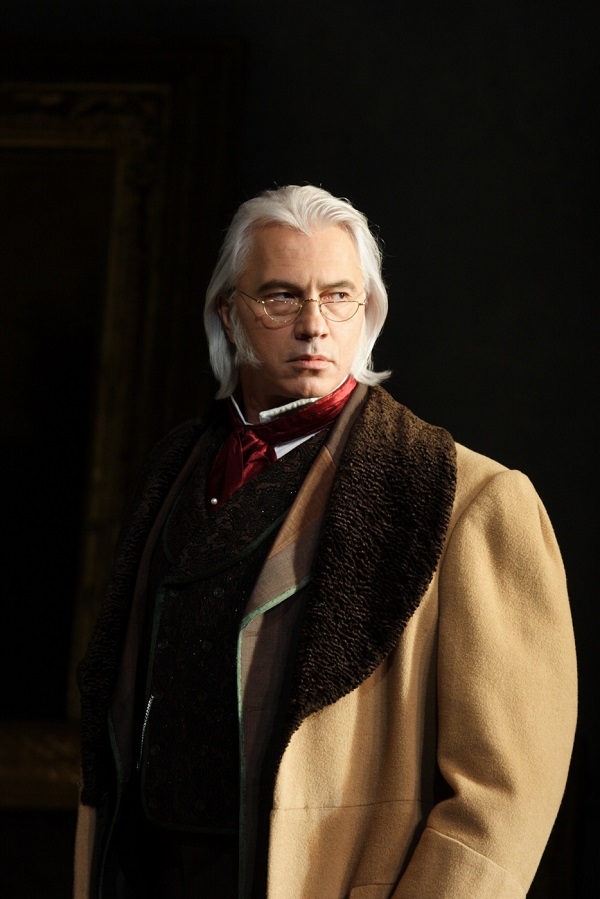La Traviata, Royal Opera | reviews, news & interviews
La Traviata, Royal Opera
La Traviata, Royal Opera
Opera lovers will not want to miss Damrau's authoritative, vocally triumphant Violetta

The German soprano Diana Damrau has had the role of Violetta Valéry in La Traviata in her sights for a very long time. As she has explained in interviews, seeing the Zeffirelli film of the opera, with Teresa Stratas in the title role, as a 12-year old was a decisive moment in making her want to become a singer. That was 30 years ago.
Damrau's musicality and security of vocal line are spellbinding. It is impossible to imagine the role being more cleanly, accurately or musically sung. Her sense of line and phrase are impeccable. The top E flat (her choice, the score gives no instruction) at the end of “Sempre libera” in Act One rang out strong and completely true. It didn't feel shrieky or dangerous, but rather what Damrau is there for. According to the people who know and care about these things (see video overleaf), that note sits comfortably in her vocal range, which can extend up to a fourth higher – to a G sharp.
What Hvorostovsky brings to the role is an air of coldness and detachment
Damrau also brought a consistent and clear definition to the character. The moments in Act Two and Three when she beseeches either the men around her, or God, to understand the wretchedness of her fate were made to count, and were extremely affecting. Her singing of "you cannot understand all the love in this heart" as Alfredo abandons her was particularly poignant.
The male protagonists were the Sardinian tenor Francesco Demuro as Alfredo and Dmitri Hvorostovsky (pictured below) as his father. Demuro has a pleasing tone, more lirico than truly spinto, and sings the role well rather than remarkably. Hvorostovsky received his first round of applause, rock-star style, for the mere fact of having walked onto the stage. His Act Two aria was delivered with beautiful full tone, his contrition in the final act seemed genuine, but overall what he brings to the role is an air of coldness and detachment. A defining moment came when Violetta asked him to accept him to accept her as a daughter and threw herself at him. He stood there implacably like a statue; she just fell away.
 A voice in a minor part which stood out as strong, characterful and distinctive was that of another Russian, the Bolshoi-trained mezzo-soprano Nadezhda Karyazina. Jihoon Kim as Doctor Grenvil was another strong piece of casting.
A voice in a minor part which stood out as strong, characterful and distinctive was that of another Russian, the Bolshoi-trained mezzo-soprano Nadezhda Karyazina. Jihoon Kim as Doctor Grenvil was another strong piece of casting.
The production, which was Richard Eyre's first venture into opera directing, with designs set in the historically correct period by Bob Crowley, is now 20 years old. It has developed its own performance history and frames of reference. It has been issued on DVD in two different versions. One element of continuity is the presence of Director of movement Jane Gibson, who has handled the gipsy/ matador episodes with finesse and understanding since 1994. The chorus and dancers made a superb contribution here. Although they had given some of the highlights of the evening, the whole ensemble didn't get the curtain-call they deserved.
Israeli conductor Dan Ettinger did not have a great first night. People recalled in the first interval the sparks which Solti had generated right from the start of the very first performance of the production, and by those standards, this one seemed very underpowered. Ettinger's real problems came later, however, in handling the many allargandos and morendos which bring numbers to a quiet close. His slowing-down of the pulse failed to communicate properly to either stage or pit, and several of those moments sounded very hesitant indeed, rather than fitting in as a natural part of Verdi's musical and dramatic language. Things are bound to get better during the run.
But this was Damrau's evening. Opera-lovers and devotees of fine singing will not want to miss her authoritative, vocally triumphant Violetta. She takes the role on more six evenings between now and early May, when another cast, led by the American soprano Ailyn Perez and Simon Keenlyside, will take over.
rating
Explore topics
Share this article
The future of Arts Journalism
You can stop theartsdesk.com closing!
We urgently need financing to survive. Our fundraising drive has thus far raised £49,000 but we need to reach £100,000 or we will be forced to close. Please contribute here: https://gofund.me/c3f6033d
And if you can forward this information to anyone who might assist, we’d be grateful.

Subscribe to theartsdesk.com
Thank you for continuing to read our work on theartsdesk.com. For unlimited access to every article in its entirety, including our archive of more than 15,000 pieces, we're asking for £5 per month or £40 per year. We feel it's a very good deal, and hope you do too.
To take a subscription now simply click here.
And if you're looking for that extra gift for a friend or family member, why not treat them to a theartsdesk.com gift subscription?
more Opera
 Carmen, English National Opera review - not quite dangerous
Hopes for Niamh O’Sullivan only partly fulfilled, though much good singing throughout
Carmen, English National Opera review - not quite dangerous
Hopes for Niamh O’Sullivan only partly fulfilled, though much good singing throughout
 Giustino, Linbury Theatre review - a stylish account of a slight opera
Gods, mortals and monsters do battle in Handel's charming drama
Giustino, Linbury Theatre review - a stylish account of a slight opera
Gods, mortals and monsters do battle in Handel's charming drama
 Susanna, Opera North review - hybrid staging of a Handel oratorio
Dance and signing complement outstanding singing in a story of virtue rewarded
Susanna, Opera North review - hybrid staging of a Handel oratorio
Dance and signing complement outstanding singing in a story of virtue rewarded
 Ariodante, Opéra Garnier, Paris review - a blast of Baroque beauty
A near-perfect night at the opera
Ariodante, Opéra Garnier, Paris review - a blast of Baroque beauty
A near-perfect night at the opera
 Cinderella/La Cenerentola, English National Opera review - the truth behind the tinsel
Appealing performances cut through hyperactive stagecraft
Cinderella/La Cenerentola, English National Opera review - the truth behind the tinsel
Appealing performances cut through hyperactive stagecraft
 Tosca, Royal Opera review - Ailyn Pérez steps in as the most vivid of divas
Jakub Hrůša’s multicoloured Puccini last night found a soprano to match
Tosca, Royal Opera review - Ailyn Pérez steps in as the most vivid of divas
Jakub Hrůša’s multicoloured Puccini last night found a soprano to match
 Tosca, Welsh National Opera review - a great company reduced to brilliance
The old warhorse made special by the basics
Tosca, Welsh National Opera review - a great company reduced to brilliance
The old warhorse made special by the basics
 BBC Proms: The Marriage of Figaro, Glyndebourne Festival review - merriment and menace
Strong Proms transfer for a robust and affecting show
BBC Proms: The Marriage of Figaro, Glyndebourne Festival review - merriment and menace
Strong Proms transfer for a robust and affecting show
 BBC Proms: Suor Angelica, LSO, Pappano review - earthly passion, heavenly grief
A Sister to remember blesses Puccini's convent tragedy
BBC Proms: Suor Angelica, LSO, Pappano review - earthly passion, heavenly grief
A Sister to remember blesses Puccini's convent tragedy
 Orpheus and Eurydice, Opera Queensland/SCO, Edinburgh International Festival 2025 review - dazzling, but distracting
Eye-popping acrobatics don’t always assist in Gluck’s quest for operatic truth
Orpheus and Eurydice, Opera Queensland/SCO, Edinburgh International Festival 2025 review - dazzling, but distracting
Eye-popping acrobatics don’t always assist in Gluck’s quest for operatic truth
 MARS, Irish National Opera review - silly space oddity with fun stretches
Cast, orchestra and production give Jennifer Walshe’s bold collage their all
MARS, Irish National Opera review - silly space oddity with fun stretches
Cast, orchestra and production give Jennifer Walshe’s bold collage their all
 Káťa Kabanová, Glyndebourne review - emotional concentration in a salle modulable
Janáček superbly done through or in spite of the symbolism
Káťa Kabanová, Glyndebourne review - emotional concentration in a salle modulable
Janáček superbly done through or in spite of the symbolism

Add comment